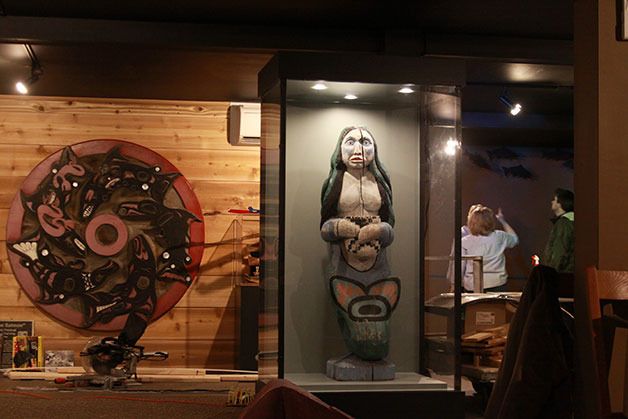As proud as Rick Castellano has been of the history on display at the Island County Historical Museum, he’s always felt it was lacking a significant piece of Whidbey Island’s story.
The museum’s exhibits concentrated mostly on Whidbey Island history in the days since white settlers arrived on the island around 1850 and didn’t focus much on the earliest inhabitants despite their 10,000 years on the land.
A large gap in the telling of Whidbey Island history was the impetus of a new Native American exhibit that was unveiled to the public Saturday, Jan. 24, at the Coupeville museum.
Castellano, the museum’s executive director, has devoted a 1,400-square-foot portion of the basement to permanently showcase a “Native People — Native Places” exhibit that sheds light largely on the lives of Native Americans who once lived along the beaches of Penn Cove for centuries, as well as other tribes.
Instead of an attempt to provide the whole picture, Castellano sees the exhibit as a way to share many pieces of local Native American history one display at a time.
“It will continue. It will never be done,” Castellano said. “It will be ever-evolving.”
The exhibit is the product of a year’s worth of preparation and seven years of careful planning.
The room features a large collection of artifacts, pieces and photographs that represent the area’s earliest inhabitants and were long stored away in the basement.
Special focus will be placed on the Lower Skagit people, now of the Swinomish Indian Tribal Community, and also the Snohomish, now part of the Tulalip Tribes.
“I am so thrilled with the whole exhibit,” said Carol Castellano, Rick’s wife. “Rick was so committed to making sure this part of Whidbey Island history isn’t lost.”
The museum’s signature item is a 28-foot-long Snakelum Family Canoe built in the 1850s that rests in front of a massive lit panoramic image of Penn Cove by Coupeville photographer Denis Hill.
 It is one of the oldest known Native American canoes in Washington.
It is one of the oldest known Native American canoes in Washington.
Hill used photo-editing software to remove homes and buildings to depict a scene before white settlers arrived on the island.
“This is our ‘wow factor,’ ” Rick Castellano said.
A second, smaller Native American canoe also will be on display. It was built in the early 20th century by Alex Kettle, a skilled carver and Lower Skagit member.
Other features at the exhibit include a salmon wheel that was retired from the Penn Cove Water Festival and original festival memorabilia.
One Coupeville resident loaned a large wood carving of a local Native American legend, the Maiden of Deception Pass, which is encased in glass.
Another donated a chair made of driftwood to use for story-telling.
The Coupeville and Central Whidbey Lions clubs pooled their efforts to provide a showcase of Native American baskets.
The Swinomish and Tulalip tribes, Penn Cove Water Festival Association and individuals provided financial support to help convert the basement into a Native American exhibit.
Numerous volunteers performed the labor that included building false walls, rustic cedar doors and canoe stands, painting, and other tasks.
“The handwork that’s gone into this is mind-boggling,” Rick Castellano said.
A private tribal blessing of the exhibit was scheduled for Friday, Jan. 23, involving members of the Swinomish and Muckleshoot tribes, who are descendants of Charlie Snakelum and Chief Snetlun of the Lower Skagit Tribe on Penn Cove.
Snakelum, the grandson of Snetlun, was the last owner of the family canoe. When he died in 1934, the canoe was put on display atop a canoe shed on the grounds of the present-day Coupeville museum.
(Below: Local Native American legend the Maiden of Deception Pass)

Three different woodcarvers worked for three years to restore the canoe and get it ready for exhibition.
The “Native People — Native Places” exhibit will coincide with another traveling exhibit that also is opening Jan. 24 at the Coupeville museum.
“Northwest Treaty Trail, 1854-1856” is an exhibit that will be on display upstairs from Jan. 24 to April 12. Its appearance in Coupeville is sponsored by local nonprofit Historic Whidbey.
The Island County Historical Museum is open from 10 a.m. to 4 p.m. Monday through Saturday and from 11 a.m. to 4 p.m. Sunday.
General admission is $4; $3 for seniors, students and active military and dependents.
The museum is located near the Coupeville waterfront at 908 NW Alexander St.
For more information, visit the Historical Society’s website.


